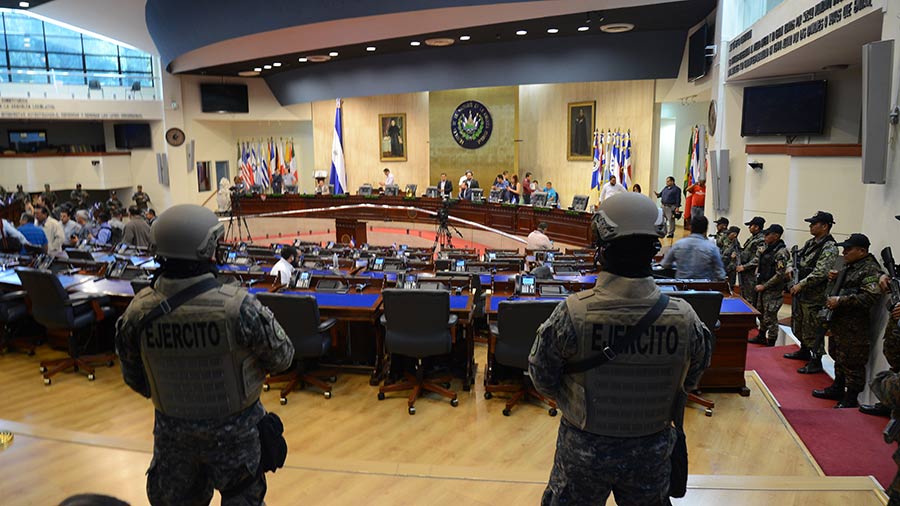
The recent economic stimulus package approved in the United States includes a clause that punishes governments in the Northern Triangle for their corruption and little commitment to democracy.
In just over a year and a half, Nayib Bukele’s presidency has shown clear signs of a systematic attack on the institution and the rule of law in El Salvador: it has rejected court rulings, harassed opponents, closed the doors of transparency and, worse, used force. security as armed arms of his political whims.
This did not go unnoticed in the United States, El Salvador’s main ally. On the eve of a change of government and amid Bukele’s efforts to pay lobbyists to clean up his image in Washington, his North American ally will reduce assistance to the Salvadoran armed forces.
This reduction is part of the extended package of budget and incentives to fight coronavirus that both houses of the US Congress recently approved and that President Trump ratified last Sunday, December 27th.
You may be interested in: US Congress passes law to deny entry to corrupt people in the Northern Triangle
Among the annexes to the main project, there was a clause aimed at fighting corruption in Central America, which includes this reduction of funds from the State Department for the purchase of US defense equipment for El Salvador, Guatemala and Honduras.
Bukele downplayed a lawmaker who promoted the reduction
Throughout his incipient presidency, Bukele has shown signs of attack on institutions that have not gone unnoticed in Washington DC. Although the Trump administration has been silent in the face of clear abuses of power, considering Bukele an ally in its immigration policies, both sides of the legislature have spoken out on numerous occasions against the coups of the Salvadoran president’s rule of law.
One of the legislators who signed these declarations demanding respect for institutionalization was Norma Torres, who is a member of the House of Representatives for the state of California. At the time, Bukele downplayed Torres and other lawmakers who spoke out against his abuses, said they were unrepresentative, and even suggested that they sign only by signing, without knowing what the letters contained.
The same legislator who was minimized was the one who promoted the partial reduction of funds for the armed forces, which was approved by the Senate and sanctioned by Trump.
Read also: Three keys to understanding Joe Biden’s plan for Central America
This bill includes other types of sanctions against government officials who have affected democracy in El Salvador, Honduras and Guatemala. The Joe Biden government, which will take office on January 20, will have just under 6 months to provide a list of people it considers corrupt in the Northern Triangle, and the country will cancel visas and impose sanctions, as it was. approved by both legislative chambers.
This, combined with the Biden plan for Central America, which has dire consequences for the corrupt, is an obstacle for countries in the Northern Triangle that have become accustomed to the Trump administration’s transactional style: they have faithfully collaborated with immigration policies in exchange for receiving the award. . Washington and a repulsive look at the obvious abuses of power.
Related note: Republican lawmakers see Bukele slipping away from democracy
Former US Ambassador to El Salvador Mari Carmen Aponte told El Diario de Hoy a few months ago that President Bukele would do well to expect different treatment from the Biden government, from which he anticipated that he would have a stronger position against abuses of power.
Bad news for Bukele, good news for El Salvador
José Miguel Vivanco, director for America at Human Rights Watch (HRW), spoke in this regard, reacting to the news on Twitter saying that this is “good news for El Salvador. Bad news for Bukele. “
Vivanco, who regularly criticized the president’s abuses and was even blocked on Twitter by the president, said that “his repeated abuses have an international cost. And with the end of Trump, that cost will only increase. “
The US is reducing military aid to El Salvador
Good news for El Salvador.
Bad news for Bukele.
Its repeated abuses have an international cost.
And with the end of Trump, that cost will increase.
https://t.co/LZ96a40fjj
– José Miguel Vivanco (@JMVivancoHRW) December 29, 2020
The HRW official adapted his tweet with an image from February 9, the most iconic event of Bukele’s abandonment of the rule of law, when he led a military and police takeover of the Legislative Assembly to apply for a loan. This event was probably the pool of water in the international image of the Salvadoran president and the end of the “honeymoon” that many international observers had with Bukele.
This reduction does not cover most of the cooperation in combating drug trafficking and other tasks, but it is a message for the countries of the Northern Triangle.
“This puts these countries on an equal footing with dictatorships and failed states,” said Adam Isacson, a member of the Washington Bureau for Latin America (WOLA), a think tank for promoting the rule of law in the region.
Napoleón Campos, an expert in international affairs and a candidate for deputy for Nuestro Tiempo, stated that “Nayib Bukele did it again! He lost Fomilenio III to El Salvador, and now US military aide (president) Trump is signing the law that qualifies Bukele as corrupt and blames serious damage to democracy and the rule of law. “
For her part, Bukele’s ambassador to Washington, Milena Mayorga, expressed surprise at the cut, and in an interview with The Associated Press (AP), called for a reconsideration of the decision, in addition to highlighting Bukele’s alleged democratic commitment. .